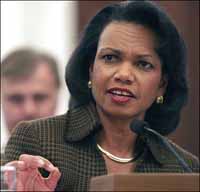Rice to lay ground for Mideast peace talks in visit to Israel, Palestinian territories
U.S. Secretary of State Condoleezza Rice will begin laying the ground for a Mideast peace conference in a visit to Israel on Wednesday, hoping to push Israelis and Palestinians closer to renewing talks.

Building on warming ties between Israel and moderate Arab countries, Israeli Prime Minister Ehud Olmert's office said Wednesday that Israel hopes "many Arab countries will attend this international meeting, including Saudi Arabia."
The statement came in reaction to an announcement Wednesday by Saudi Foreign Minister Prince Saud al-Faisal that his country had no objection to attending the gathering. Speaking at a press conference with Rice and U.S. Secretary of Defense Robert Gates, al-Faisal said the Saudis would be likely to come if the conference deals with "the heart of the peace process" and is not "just a podium for meetings and talk that do not enrich peace."
A meeting between Israeli and Saudi representatives would be a major diplomatic breakthrough. Though Israel and Saudi Arabia are both U.S. allies, representatives of the countries have never officially met and Saudi Arabia has never recognized the Jewish state.
Rice's visit to Israel and the Palestinian territories, part of a wider tour of the U.S.'s regional allies, is her first since the Islamic group Hamas seized control of the Gaza Strip in mid-June. Since then, Palestinian President Mahmoud Abbas has run the West Bank with a moderate government led by his Fatah movement, and has won broad international backing while Hamas remains largely isolated.
Olmert's office said Wednesday that the regional meeting would also be able to "grant an umbrella to the bilateral talks between Israel and the Palestinians."
Rice's meetings with Israeli leaders in Jerusalem on Wednesday and with leaders of Abbas' U.S.-backed Palestinian government in the West Bank on Thursday will be her first with the sides since the regional political constellation was altered by Hamas' defeat of Abbas' forces in Gaza in five days of fighting.
The Hamas victory in Gaza has spurred a flurry of peacemaking efforts in the past month aimed at shoring up Palestinian moderates, including a first visit to the region by international Mideast peace envoy Tony Blair and an unprecedented visit to Israel by a delegation from the 22-nation Arab League. That delegation urged Israel to accept an Arab plan, backed by the Saudis, offering peace in return for a withdrawal from all land captured in the 1967 Mideast War.
Further helping the mood of conciliation are the fears in moderate Arab states about the influence of Hamas' hardline backers in Iran and about al-Qaida's brand of extremist Islam.
Israel has carried out several gestures meant to bolster Abbas, including renewing the transfer of millions of dollars in taxes collected from Palestinians and releasing several hundred Palestinian prisoners from Israeli jails.
Bush's July 16 announcement of a Mideast conference was meant to build on the new momentum and work toward the establishment of a Palestinian state.
Palestinian officials said it was time to move from gestures to discussing the core issues of the conflict - the borders of the future Palestinian state, the status of Jerusalem and the fate of Palestinian refugees who lost their homes in the fighting that followed Israel's creation in 1948.
"The main topic will be the political negotiations," Palestinian negotiator Saeb Erekat said of Rice's meetings with Abbas and Palestinian Prime Minister Salam Fayyad on Thursday. "We don't want a new initiative."
On Wednesday, Rice is scheduled to meet Olmert, Foreign Minister Tzipi Livni, Defense Minister Ehud Barak and President Shimon Peres.
In Rice's meeting with Barak, the two are slated to discuss American plans for a major arms sale to Gulf Arab states, including Saudi Arabia, and a parallel boost in defense aid to Israel, Israeli defense officials said, speaking on condition of anonymity because they were not authorized to talk to the press.
Israel loudly opposed such arms sales in the past but has offered no resistance this time, saying the weapons were needed to offset Iran's military strength.
Subscribe to Pravda.Ru Telegram channel, Facebook, RSS!


